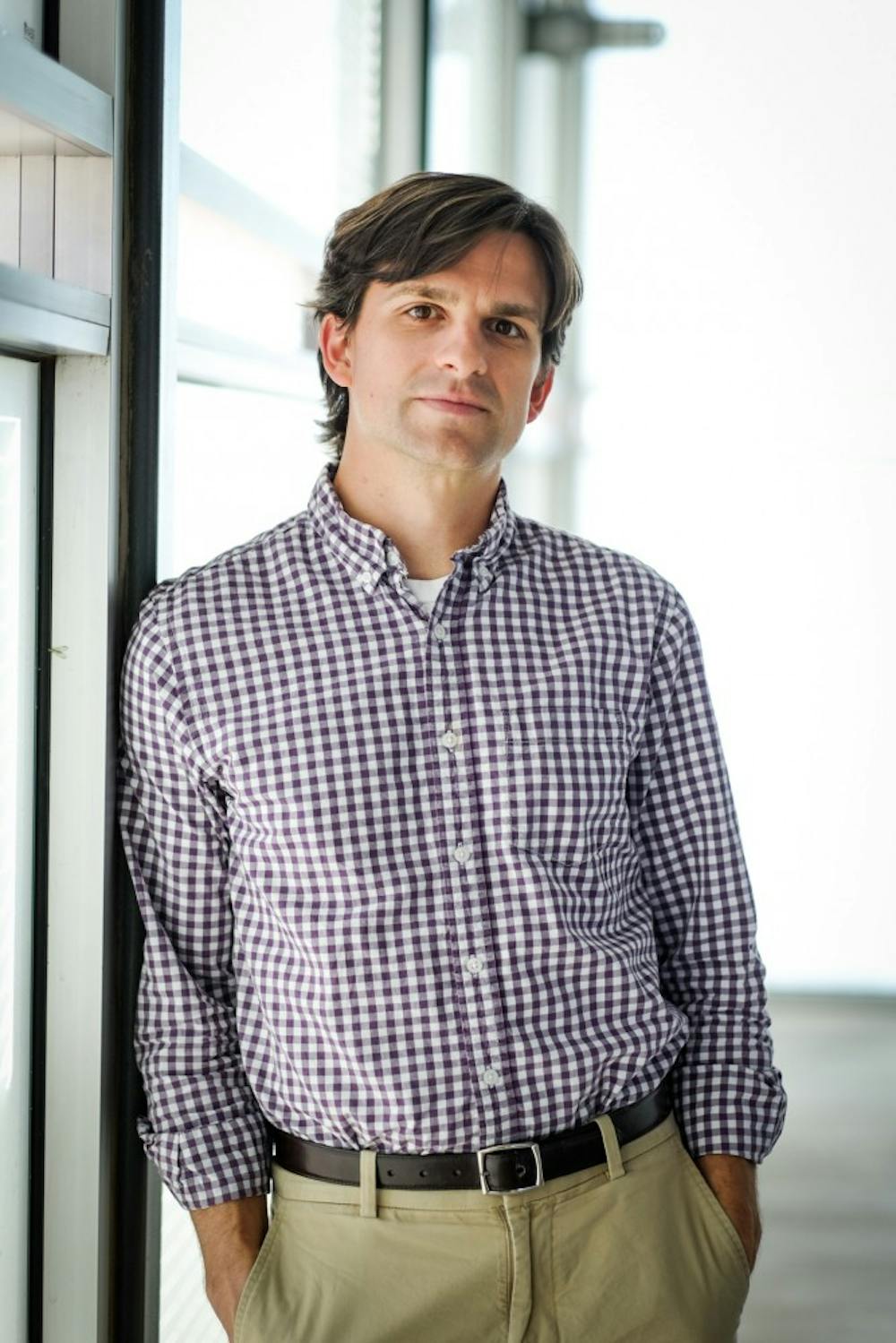 Religious studies professor Jason Bruner poses for a portrait near his office at the Tempe
Religious studies professor Jason Bruner poses for a portrait near his office at the Tempe
campus on Feb. 26, 2015. Bruner is writing a book on the East African (Balokole) Revival
in Uganda. (Andrew Ybanez/The State Press)
Growing up in a Christian home in northwest Georgia, ASU Assistant Professor Jason Bruner became interested in studying religion at a young age through experiences with different mission and cultural exchange trips.
Religion was always a part of Bruner’s life and led him to receive his Ph.D from Princeton Theological Seminary. He is now part of the University's growing religious studies program and is also writing his own book.
“I’ve done religious studies from the beginning of college, and then I got interested in the history of Christianity through that because I got interested in the history of Christians who went out to convert people in other parts of the world,” Bruner said. “So questions about why they went about doing that, how they went about doing that, were part of my own reflections on the emphasis of missions that were part of the churches that I grew up in.”
These interactions of missionaries around the world led to Bruner’s academic work in the field of Christianity outside of the U.S. and Western Europe.
Becoming a professor
Before ending up at ASU as a professor, Bruner said he thought about other lines of work but had always wanted to go into research and teaching.
“For a short time, I thought I would go into international development and (non-governmental organization) work, but do it in a way that took seriously the reality on the ground that often times there are churches and religious communities that are part of ‘secular NGO’ programs that are part of the infrastructure of how they get things done in Latin America and Africa and Asia,” he said.
After graduating from Princeton, many of Bruner’s friends began getting jobs at small liberal arts schools and Bruner said he felt the same was going to happen with him until ASU had a position available.
He said the University was looking for someone who studied Christianity outside of North America and was more focused on non-theological research.
“I was pleasantly surprised to be offered the job. Most of my friends from Princeton seminary went to small liberal arts schools and those jobs are fine, but I expected to end up at a place like that too and not at ASU but it has worked out well so far,” Bruner said.
Connecting the disciplines
The religious studies program is on the rise at ASU with young professors being hired recently and the continuation of multiple disciplines working together, Bruner said.
“I think in many ways ASU is a really great place to do religious studies,” he said. “I think the religious studies program has a very wide range of interests and methodologies in addition to regional specialties within other kinds of traditions or faiths.”
There are very few places a student can get the kind of global coverage and engagement of topics concerning religion and ASU is one of those places, Bruner said.
Leah Sarat, assistant professor of religious studies, said religious studies requires interaction between disciplines.
“One thing about religious studies is that it is inherently interdisciplinary so we have people trained as historians, religious studies scholars, and anthropologists,” she said. “So that is a good strength of our program that we have a lot of diverse people doing very different sorts of things, but we manage to bring them together and have a common language and a common department.”
Along with the interaction of disciplines with religious studies is the strength of the graduate program is the area of religion, Sarat said.
“I think one thing that has been very strong is our graduate program in the specific emphasis of anthropology of religion,” she said. “We have had a lot of students coming from different areas wanting to pursue graduate work in the anthropology of religion.”
Gaymon Bennett, ASU religion professor, said the interaction between disciplines benefits all of those doing research and also sums up the nature of Bruner’s work because he is focused on interdisciplinary studies.
“People of different disciplinary backgrounds not only know different stuff ... but they tend to have different dispositions so certain things attract them and interest them,” Bennett said. “All of this comes together with Jason’s work pretty acutely due to the nature of his work. On the one hand, he is a historian but a historian of religion and Christianity in particular and global christianity more particularly still.”
Research
Bruner’s research led him to look at the history of Christianity in 20th century Uganda due to politics playing out within the religion in the country, he said.
“Uganda, I think, has caught my attention because of the role its Anglican bishops were playing a few years ago in global debates in sexuality in the Anglican community,” Bruner said. “There are churches just about everywhere in Uganda and is a place where being publicly Christian is very much a way of life in Uganda."
Bruner is now writing a book on the East African (Balokole) Revival in Uganda that focuses on how Ugandan Christians began articulating a new way of life through this revival message.
“It’s a moment I think in which Ugandans and others in East African Christians begin to make Christianity something that makes sense to them and is more distinctly theirs and not simply a replication of what missionaries were saying.”
Along with the book Bruner has been published in multiple journals including the Journal of Religion in Africa, Studies in World Christianity, Social Science Missions and contributed to the book “A Cultural History of Firearms in the Age of Empire” with a chapter titled, “Fishers of Men and Hunters of Lion.”
Hitting the trails
Outside of the classroom, Bruner is an avid outdoorsman and loves to cycle and trail run.
“I’ve been into cycling for a long time,” he said. “I got into mountain bike racing in middle school and periodically in high school. By college, I was primarily doing road cycling, and I raced some in college and through graduate school and during my Ph.D. I raced intermittently in road cycling.”
Bruner said he uses cycling as a way to clear his head and not think about what is going on at work or in his research.
“It’s something that has just been there and it does something for my soul that other forms of exercising doesn’t,” he said. “I don’t ride to think. I ride to not think, to get into a rhythm and carry that for as long as I can.”
Through his time riding the trails on his bike and competing in duathlons, a combination sporting event using a format of run-bike-run, Bruner said he has started to get interested in trail running and has set a new goal of running a 50-kilometer trail race in the coming months.
“I recently got into trail running and am slowly getting pulled into that world which is it’s own subculture that I had no idea of,” he said. “With the trail running, it is the first time I’ve enjoyed running and I think there is a unique kind of challenge to getting on an isolated trail in the middle of the desert, in the sun and just saying, ‘I hope you make it to the end,’ and for whatever reason, I find that really appealing.”
Reach the reporter at jshanco2@asu.edu or on follow @joey_hancock on Twitter.
Like The State Press on Facebook and follow @statepress on Twitter.




